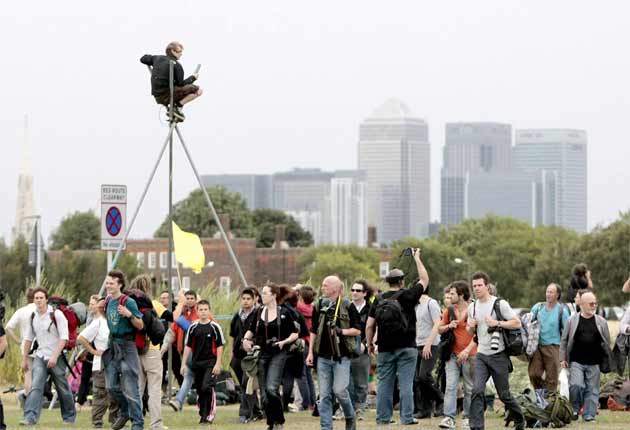Climate Camp set up in the footsteps of the Peasants' Revolt
Symbolic setting chosen for annual protest against global warming

The symbolism was eye-catching. Britain's climate campers set up their annual protest camp yesterday on Blackheath, the historic London open space that was key in the peasants' revolt.
The 1,000-plus green activists are camped this morning on the fields where Wat Tyler's peasant army assembled for its assault on The City of London in June 1381. And they are planning their own assault – on what they see as the companies, institutions and government departments helping to cause global warming (or not doing enough to stop it).
Over the next week the climate campers will be carrying out a series of "direct actions" from the camp against at least a dozen prominent targets, from the headquarters of oil giants such as Shell and BP to Heathrow Airport and the Bank of England. These will consist of demonstrations, entrance blockings and even attempted occupation of the offices of what the campaigners have labelled "climate criminals" – although the site itself is not likely to see any mass demonstrations, in contrast with the previous climate camps at power stations and Heathrow Airport.
Blackheath, three miles south-east of London Bridge, was consciously chosen for its symbolism, the camp organisers said yesterday, noting that from it, in 1381, Wat Tyler's colleague, the preacher John Ball, gave "probably the country's first speech against the class-ridden nature of society. "They said in a statement: "What better place to continue the struggle for social justice and the fight against climate change?"
The site also overlooks the steel and glass tower of Canary Wharf, Britain's ultimate symbol of capitalism for a group of people whose first banner erected on the site proclaimed: "Capitalism Kills".
There is still considerable resentment against the police from the campaigners after the last climate camp in Bishopsgate in London during the G20 protests in April – where bystander Ian Tomlinson died. It ended with a number of campers injured after police attempted to move them on. Police tactics have subsequently come in for severe criticism in several reports and the Met is clearly taking – initially at least – a softly-softly approach to the current camp. No attempt was made to stop or hinder the set up yesterday.
But then, the police seem not to have known its location until it was too late. It was still not generally known among the campers when they assembled at six central London "swoop points" at midday yesterday, when The Independent joined forces with activist Catherine Lloyd from Bristol, a veteran climate camper – she was at the Bishopsgate gathering in April, and at last year's climate camp at Kingsnorth in Kent – site of a proposed coal-fired power station from the German giant E.ON.
We met Catherine at Piccadilly Circus, running from Paddington Station with her rucksack and her tent for the "BP Swoop Point" – an assembly position in St James's Square, outside BP's corporate headquarters. About 100 rucksacked, tent-carrying activists came together with no idea of the ultimate destination, and were treated while waiting to an impassioned denunciation of BP for its extraction of oil from the "tar sands" of Alberta in Canada.
In what seemed to be a cat-and-mouse game to fool the police, we proceeded to Trafalgar Square, and after another wait of more than an hour, to Charing Cross station – where a text message on Catherine's mobile revealed the destination. "Go up Wat Tyler road," it said, and for anyone with a sense of history, the symbolism was clear at once, and made for a smile.
Catherine, 21, a history student in Bristol, is typical of the army of activists, the overwhelming majority young and idealistic, now under canvas where Wat Tyler's men once came together. "We can't rely on politicians to take action against climate change so we have to do it ourselves," she said. "The whole camp is about how ordinary people can change things by doing extraordinary things together."
Last night, after helping put up the site fence, meeting old friends and attending the site meeting, she was in her tent, hoping a previous leak would not prove troublesome again, as a strong wind flapped it from side to side.
Blackheath: A history of protest
* The Peasants' Revolt of 1381 began as a local revolt in Essex but quickly spread. By 12 June 60,000 Kentish peasants had arrived at Blackheath and set about attacking political targets in the city. They burned down the Savoy Palace, home of the powerful John of Gaunt, uncle to Richard II.
* Alarmed at the protest King Richard met the peasants where they demanded an end to all lordship beyond that of the King, and the redistribution of the Church's estates.
* But the rebellion failed after one of its leaders, Wat Tyler, was mortally wounded by the Lord Mayor of London. The nobles quickly regained their control, and most of the other leaders were executed.
Join our commenting forum
Join thought-provoking conversations, follow other Independent readers and see their replies
Comments
Bookmark popover
Removed from bookmarks